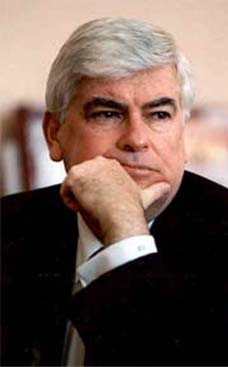2007.01.01: January 1, 2007: Headlines: Peace: Peacemaking: Psychology: Foreign Policy: People have dozens of decision-making biases, and almost all favor conflict rather than concession
Peace Corps Online:
Peace Corps News:
Peace Corps Library:
Peace Building:
January 23, 2005: Index: PCOL Exclusive: Peace, Peace Builders, Peace Makers :
2007.01.01: January 1, 2007: Headlines: Peace: Peacemaking: Psychology: Foreign Policy: People have dozens of decision-making biases, and almost all favor conflict rather than concession
People have dozens of decision-making biases, and almost all favor conflict rather than concession

Pychological impulses incline national leaders to exaggerate the evil intentions of adversaries, to misjudge how adversaries perceive them, to be overly sanguine when hostilities start, and overly reluctant to make necessary concessions in negotiations. In short, these biases have the effect of making wars more likely to begin and more difficult to end.
People have dozens of decision-making biases, and almost all favor conflict rather than concession
Why Hawks Win
By Daniel Kahneman, Jonathan Renshon
January/February 2007
Why are hawks so influential? The answer may lie deep in the human mind. People have dozens of decision-making biases, and almost all favor conflict rather than concession. A look at why the tough guys win more than they should.
[Excerpt]
National leaders get all sorts of advice in times of tension and conflict. But often the competing counsel can be broken down into two basic categories. On one side are the hawks: They tend to favor coercive action, are more willing to use military force, and are more likely to doubt the value of offering concessions. When they look at adversaries overseas, they often see unremittingly hostile regimes who only understand the language of force. On the other side are the doves, skeptical about the usefulness of force and more inclined to contemplate political solutions. Where hawks see little in their adversaries but hostility, doves often point to subtle openings for dialogue.
As the hawks and doves thrust and parry, one hopes that the decision makers will hear their arguments on the merits and weigh them judiciously before choosing a course of action. Don’t count on it. Modern psychology suggests that policymakers come to the debate predisposed to believe their hawkish advisors more than the doves. There are numerous reasons for the burden of persuasion that doves carry, and some of them have nothing to do with politics or strategy. In fact, a bias in favor of hawkish beliefs and preferences is built into the fabric of the human mind.
Social and cognitive psychologists have identified a number of predictable errors (psychologists call them biases) in the ways that humans judge situations and evaluate risks. Biases have been documented both in the laboratory and in the real world, mostly in situations that have no connection to international politics. For example, people are prone to exaggerating their strengths: About 80 percent of us believe that our driving skills are better than average. In situations of potential conflict, the same optimistic bias makes politicians and generals receptive to advisors who offer highly favorable estimates of the outcomes of war. Such a predisposition, often shared by leaders on both sides of a conflict, is likely to produce a disaster. And this is not an isolated example.
In fact, when we constructed a list of the biases uncovered in 40 years of psychological research, we were startled by what we found: All the biases in our list favor hawks. These psychological impulses—only a few of which we discuss here—incline national leaders to exaggerate the evil intentions of adversaries, to misjudge how adversaries perceive them, to be overly sanguine when hostilities start, and overly reluctant to make necessary concessions in negotiations. In short, these biases have the effect of making wars more likely to begin and more difficult to end.
None of this means that hawks are always wrong. One need only recall the debates between British hawks and doves before World War II to remember that doves can easily find themselves on the wrong side of history. More generally, there are some strong arguments for deliberately instituting a hawkish bias. It is perfectly reasonable, for example, to demand far more than a 50-50 chance of being right before we accept the promises of a dangerous adversary. The biases that we have examined, however, operate over and beyond such rules of prudence and are not the product of thoughtful consideration. Our conclusion is not that hawkish advisors are necessarily wrong, only that they are likely to be more persuasive than they deserve to be.
Read the rest of the article here.
Links to Related Topics (Tags):
Headlines: January, 2007; Peace; Psychology
When this story was posted in January 2007, this was on the front page of PCOL:





Peace Corps Online The Independent News Forum serving Returned Peace Corps Volunteers
 | Ron Tschetter in Morocco and Jordan
On his first official trip since being confirmed as Peace Corps Director, Ron Tschetter (shown at left with PCV Tia Tucker) is on a ten day trip to Morocco and Jordan. Traveling with his wife (Both are RPCVs.), Tschetter met with volunteers in Morocco working in environment, youth development, health, and small business development. He began his trip to Jordan by meeting with His Majesty King Abdullah II and Her Majesty Queen Rania Al Abdullah and discussed expanding the program there in the near future. |
 | Chris Dodd's Vision for the Peace Corps
Senator Chris Dodd (RPCV Dominican Republic) spoke at the ceremony for this year's Shriver Award and elaborated on issues he raised at Ron Tschetter's hearings. Dodd plans to introduce legislation that may include: setting aside a portion of Peace Corps' budget as seed money for demonstration projects and third goal activities (after adjusting the annual budget upward to accommodate the added expense), more volunteer input into Peace Corps operations, removing medical, healthcare and tax impediments that discourage older volunteers, providing more transparency in the medical screening and appeals process, a more comprehensive health safety net for recently-returned volunteers, and authorizing volunteers to accept, under certain circumstances, private donations to support their development projects. He plans to circulate draft legislation for review to members of the Peace Corps community and welcomes RPCV comments. |
 | He served with honor
One year ago, Staff Sgt. Robert J. Paul (RPCV Kenya) carried on an ongoing dialog on this website on the military and the peace corps and his role as a member of a Civil Affairs Team in Iraq and Afghanistan. We have just received a report that Sargeant Paul has been killed by a car bomb in Kabul. Words cannot express our feeling of loss for this tremendous injury to the entire RPCV community. Most of us didn't know him personally but we knew him from his words. Our thoughts go out to his family and friends. He was one of ours and he served with honor. |
 | Peace Corps' Screening and Medical Clearance
The purpose of Peace Corps' screening and medical clearance process is to ensure safe accommodation for applicants and minimize undue risk exposure for volunteers to allow PCVS to complete their service without compromising their entry health status. To further these goals, PCOL has obtained a copy of the Peace Corps Screening Guidelines Manual through the Freedom of Information Act (FOIA) and has posted it in the "Peace Corps Library." Applicants and Medical Professionals (especially those who have already served as volunteers) are urged to review the guidelines and leave their comments and suggestions. Then read the story of one RPCV's journey through medical screening and his suggestions for changes to the process. |
 | The Peace Corps is "fashionable" again
The LA Times says that "the Peace Corps is booming again and "It's hard to know exactly what's behind the resurgence." PCOL Comment: Since the founding of the Peace Corps 45 years ago, Americans have answered Kennedy's call: "Ask not what your country can do for you--ask what you can do for your country. My fellow citizens of the world: ask not what America will do for you, but what together we can do for the freedom of man." Over 182,000 have served. Another 200,000 have applied and been unable to serve because of lack of Congressional funding. The Peace Corps has never gone out of fashion. It's Congress that hasn't been keeping pace. |
 | PCOL readership increases 100%
Monthly readership on "Peace Corps Online" has increased in the past twelve months to 350,000 visitors - over eleven thousand every day - a 100% increase since this time last year. Thanks again, RPCVs and Friends of the Peace Corps, for making PCOL your source of information for the Peace Corps community. And thanks for supporting the Peace Corps Library and History of the Peace Corps. Stay tuned, the best is yet to come. |
 | History of the Peace Corps
PCOL is proud to announce that Phase One of the "History of the Peace Corps" is now available online. This installment includes over 5,000 pages of primary source documents from the archives of the Peace Corps including every issue of "Peace Corps News," "Peace Corps Times," "Peace Corps Volunteer," "Action Update," and every annual report of the Peace Corps to Congress since 1961. "Ask Not" is an ongoing project. Read how you can help. |
Read the stories and leave your comments.

Some postings on Peace Corps Online are provided to the individual members of this group without permission of the copyright owner for the non-profit purposes of criticism, comment, education, scholarship, and research under the "Fair Use" provisions of U.S. Government copyright laws and they may not be distributed further without permission of the copyright owner. Peace Corps Online does not vouch for the accuracy of the content of the postings, which is the sole responsibility of the copyright holder.
Story Source: Foreign Policy
This story has been posted in the following forums: : Headlines; Peace; Peacemaking; Psychology
PCOL36025
61



















